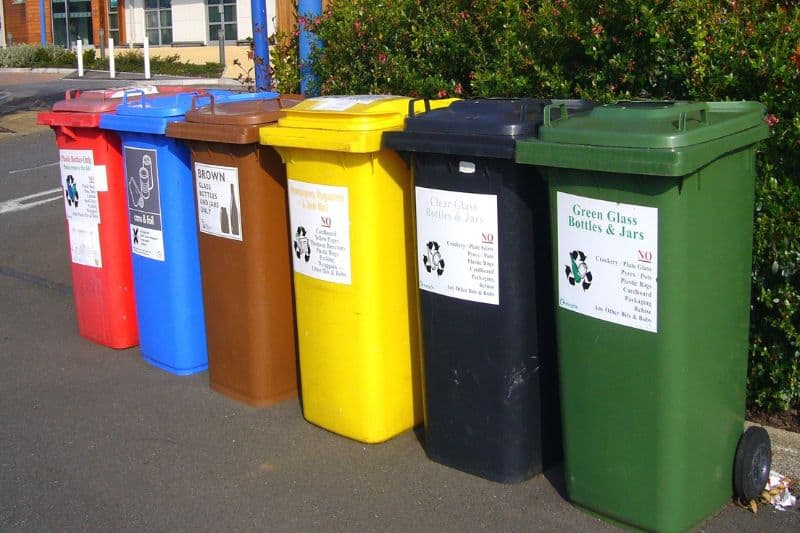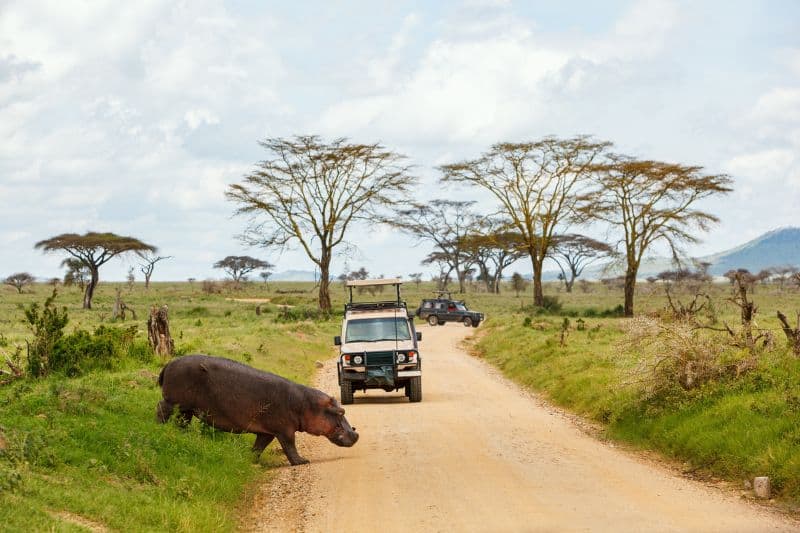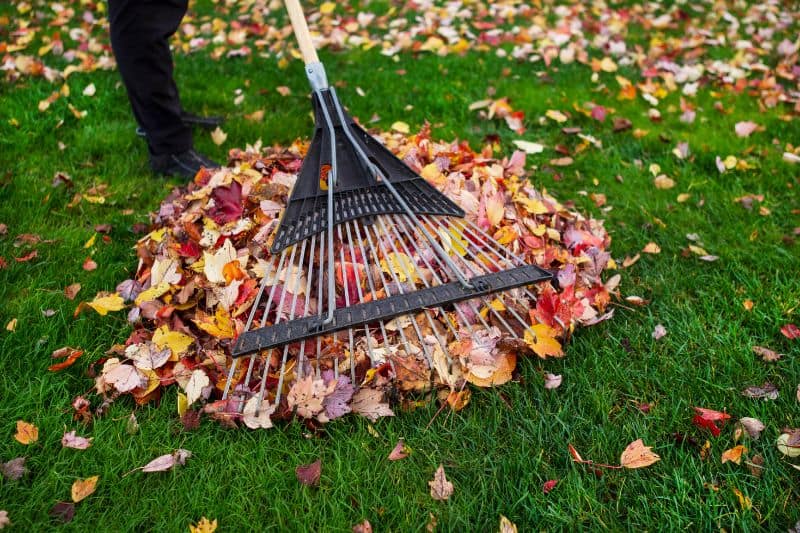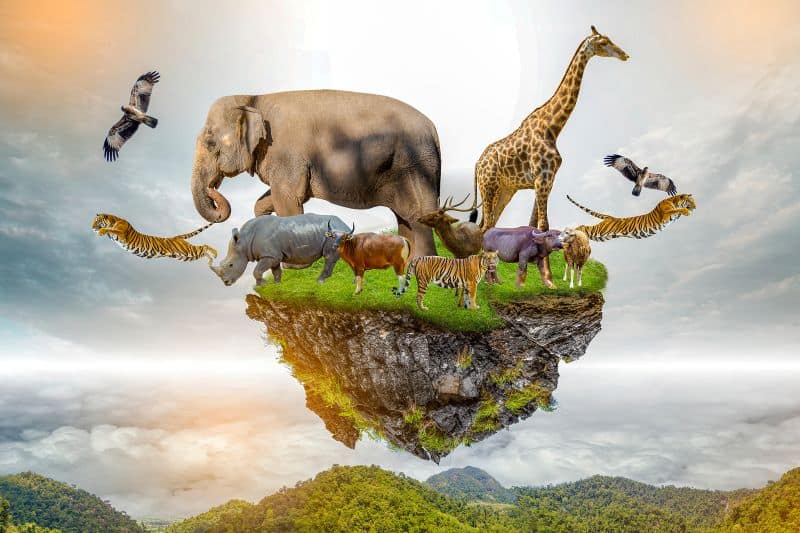Through a combination of changing climates, lost habitats, increased poaching, and increased food scarcity, there has been a lot of worrying news lately concerning the fate of wildlife worldwide.
The gloom-and-doom reports can often make the situation seem entirely hopeless; however, much can be done to protect and conserve wildlife on both a large and small scale.
Below are 40 ways that anybody can help preserve wildlife, making the world a better place for flora, fauna, and mankind alike.
1. Join Others of Similar Mind
Working with others is almost always more effective than working alone. Joining a conservation organization is a great way to pool your efforts together with the work of others to help protect against animal cruelty, hunting, or the destruction of habitat.
Of course, there are many different organizations with different goals, so you are sure to find like-minded people.
2. Plant Native Habitats
Planting native plants in your garden or on any land you own is a great way of preserving the natural habitat of local creatures. This is not only good for the population of these animals but also helps guard against invasive species, which causes problems for the native fauna.
3. Safeguard Species Through Local Ecosystem Restoration
Habitat destruction is the main threat to 85% of all threatened and endangered species, according to the International Union for Conservation of Nature. You can help reduce this threat by planting native trees, restoring wetlands, or cleaning up beaches in your area.

4. Recycle for a Sustainable Future
One of the most common pieces of rhetoric you will hear from environmental conservationists is that you should recycle, which is oft-repeated for a good reason.
Recycling is a great way to minimize our use of non-renewable resources and make the most out of our materials. Easy on the environment and the economy, there is no good reason not to recycle.
5. Minimize Resource Demand through Reuse and Recycling
Find new ways to use things you already own. If you can’t reuse, recycle. The Minnesota Zoo encourages patrons to recycle mobile phones to reduce demand for the mineral coltan, mined from lowland gorillas’ habitats.
6. Avoid Pesticides for Eco-Friendly Plant Care
If you work with plants – farming or gardening – you should avoid using pesticides and other chemicals. While these chemicals can protect your plants from pests, they also do a huge amount of damage to the ecosystem.
Beyond simply deterring and starving pests that would feed other creatures, the chemicals can damage and pollute the soil in which your plants are situated. Pesticides do not flush away quickly or easily.
7. Drive Responsibly If At All You Must
Driving is a reality of everyday life; most will do it to and from work. Driving is not particularly good for the environment, and that’s because emissions from car exhausts contribute heavily to CO2 pollution in the air. By driving more economically – slowing down and braking less – you can minimize the amount of exhaust fumes your car pumps out.

8. Drive Slowly to Protect Crossing Wildlife
Slower driving is also important in avoiding collisions with any creatures crossing the road haphazardly. Keeping a wary eye out for creatures whose habitat has been divided by roads could help avoid an accident.
9. Opt for Other Means of Traveling Where Possible
A better solution than careful driving is, of course, not driving at all. Depending on where you live and your individual travel needs, you can easily substitute a car for a bicycle or mass transit for certain journeys.
10. Donate to Wildlife Charities
While this may seem somewhat obvious, the fact is that the more money these charities receive, the more they can do to help conservation efforts worldwide.
Whether you set up a standing order, make a one-off payment, donate a large amount, or just put your spare change in a bucket, every little bit of money helps.
11. Donate for Others and Buy Merchandise
Donating to charities on your own behalf is a great step, but donating to someone else is even better.
You can also help finance the initiative by purchasing merchandise the organization sells. By buying plush toys, postcards, and even stamps sold by environmental charities, you give to the charity directly and spread the word to those you know.

12. Be A Volunteer
Don’t have money to give to charity or buy their merchandise? There’s still something you can still donate — your time.
Many organizations and zoos have volunteer programs. You can join the team to help clean beaches, rescue wild animals, or teach visitors.
13. Be Part of The Anti-Indiscriminate Killings Campaign
Indiscriminate killing of wild birds and animals, whether they are in abundance, should not be allowed anywhere. National parks and sanctuaries should be established in greater numbers to preserve the natural habitats of wild animals and birds throughout the country.
14. Pay a Visit to Game Reserves
Visit national parks and other nature reserves. Whether you live nearby or seek one out when vacationing, using nature reserves helps keep them running and offers animals safe habitats.
15. Learn More About Wildlife
Learn more about our planet’s species from wildlife experts in zoos, aquariums, national parks, and wildlife refuges. See Earth’s most amazing creatures up close. Visiting local zoos and parks can double the effect of knowing about the wildlife.
16. Be a Mindful Souvenir
When vacationing abroad, be careful what souvenirs you bring back. Cheap exotic plants and animals in shops abroad may be tempting, but they can often be protected. By buying into this peddling of protected wildlife, you help fund an industry that damages the environment. Always check before you buy it.

17. Buy Responsibly
Avoid purchasing products made from endangered animals or their parts when buying animal-derived stuff. By that, you can stop wildlife trafficking from being profitable, prompting those practicing it to stop.
18. Keep Off Exotic Items
For some, the temptation to purchase exotic items such as ivory can be great. However, ivory and similar items are almost always obtained by poaching, which is an extremely harmful industry that involves the maiming or even killing of animals. Items such as ivory should not – under any circumstances – be purchased.
19. Choose Nearby Places for Vacations
The best type of vacation is one that requires little traveling. Planes and other transportation methods contribute to releasing fossil fuels into the atmosphere, so minimizing the amount of travel you undertake is the best option.

20. Add Some Decoration to Your Glass Windows
Glass windows can be a particular hazard to birds. Clear glass is often difficult for birds to spot when flying at speed, so collisions are common. Adding decoration to your windows can prevent a bird from accidentally crashing, saving its life.
21. Keep Your Feline Within Doors Most of The Time
If you own a cat, it may be a good idea to keep it indoors. Cats are natural predators for many creatures found in the common garden and participate in huge numbers of wildlife deaths every year. When living in the wild, this is normal. However, household cats receive food, so the killed animals are simply wasted.
22. Choose Environmentally-Friendly Detergents
Be careful what you use for bathing. Soaps, including exfoliating microbeads, are incredibly damaging to the environment as these beads are not broken down by washing and can present a number of hazards to aquatic wildlife.
Also, detergents containing phosphates can lead to algal bloom in water bodies, affecting the quality of life of aquatic animals and indirectly causing their death. Thankfully, many environmentally friendly alternatives exist, so be sure to choose wisely.
23. Equip Yourself With Some Knowledge
Keep yourself informed about the status of different animals normally farmed as foodstuffs. Many species are over-farmed or farmed in improperly curated conditions, particularly fish. Knowing what kinds of animals are endangered by this process and not eating them can help tremendously sustain their populations.

24. Switch to Renewable Energy Source
Make use of renewable energy sources where available. While power production is becoming safer and cleaner by the day, fossil fuels remain one of the most popular modes of energy production. By using renewable sources such as solar where available, you can help reduce the use of pollutive fuels.
25. Actively Try to Clean up Space Around You
Litter disposed inappropriately is not just an eyesore but can be detrimental to the well-being of wildlife in various ways. Clean up whenever you find discarded litter. It will keep the wildlife and the people around it safe.
26. Trash Is Harmful to Animals
From choking hazards to ecosystem pollution, plastics and chemicals from our waste can be very dangerous to wildlife. Birds and other animals can trap their heads in plastic rings. Fish can get stuck in nets. Plus, trash pollutes everyone’s natural resources. Always dispose of trash properly.
27. Adopt Some Animals
Adopting animals is a great way to put your money where your mouth is with regard to wildlife conservation. Adopting animals such as endangered cats and other mammals ensures that your money goes directly to help care for the creatures that need it most.
28. Adopt Wildlife With Friends
Gather your friends and consider adopting an animal from a wildlife conservation group like the World Wildlife Fund (WWF). Symbolic adoptions not only support these organizations but also contribute to their vital work in protecting wildlife.

29. Plant Trees
It may sound somewhat cliché, but planting trees is one of the most effective things you can do to help preserve natural habitats. Trees don’t just act as carbon sinks; they’re homes to most bird species, squirrels, geckos, raccoons, and other animals.
30. Cultivate a Wildlife-Friendly Home
Try to keep your home and land wildlife-friendly by ensuring that it is kept clean and waste is kept secure.
31. Support Wildlife Anti-Harassment Campaigns
Support bans on cruel sports and activities such as trapping and harassing. The stress caused by such activities and the activities themselves quite often can be lethal to animals needing support.
32. Wisely Choose Your Business Partner
To promote wildlife welfare and conservation, try to avoid giving business to companies with a bad track record of animal abuse and habitat destruction. Doing this will help curb this poor behavior.
33. Opt for Composting Where Necessary
Composting solves a number of issues. In addition to being a safe way of disposing of waste and a healthy alternative to pesticides, compost heaps attract many creatures that help an ecosystem thrive.

34. Be Cautious When Working In Your Yard
Always be careful when undertaking yard work, as creatures such as hedgehogs can often take refuge in piles of loose leaves or even your compost heap. If you are not careful, they can easily find themselves on the business end of your spade.
35. Save the Bees
Bees are an essential part of all ecosystems and are being wiped out. Planting bee-friendly plants is a good way to keep the important drones around. Similarly, bees which are found on the floor are not always dead but rather exhausted. Mixing sugar and water in a teaspoon and offering it to the downed insect can help perk it up and get it flying again.
36. Remain Humane Where Possible
Spiders are another important part of the natural order, so even if you are scared by them, resist the urge to kill them. Spiders help control the population of flies, mosquitoes, and other such pests, so they are a real boon to most households. Either leave them be or take them outside.
37. Turn Off Your Lights at Night

Lights act as an animal attractant. Hence, turning your lights off at night can help keep animals in their proper sleeping patterns, which helps them sustain the natural order of things. Of course, it also means lower energy bills, so it’s a win-win.
38. Leverage Social Media Power to Drive Your Environmental Campaign
Make use of social media to spread awareness of environmental issues. By using the reach of networks such as Facebook and Twitter, you can help rally others to the cause of saving the environment.
39. Conducting Frequent Wildlife Surveys
This applies to the pertinent governmental department. It should conduct a periodic survey in all the forests regarding the conservation of wildlife to obtain knowledge about the population of all the species of wild animals and birds so that they can be helped during times of floods and famines.
40. Show Nature Some Love
Love nature and love its creation. Doing this will automatically drive you to contribute to their conservation.






